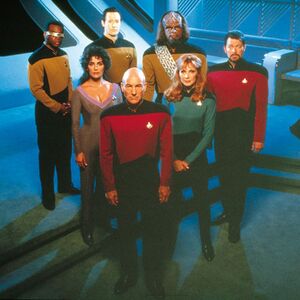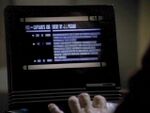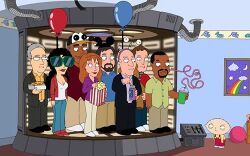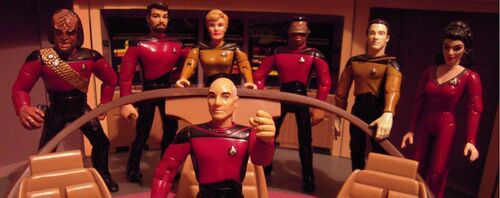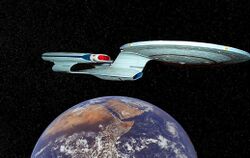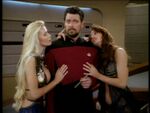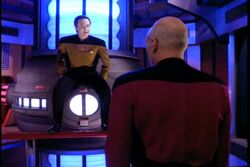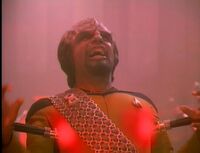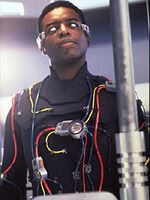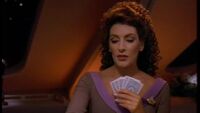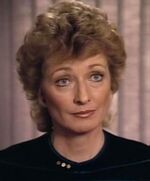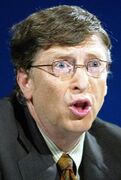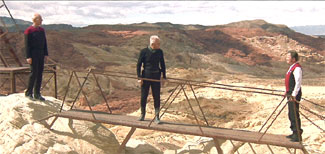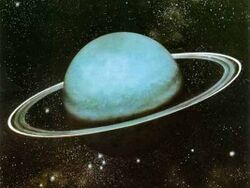Star Trek: The Next Generation
“You dare to call yourself Captain of the Enterprise? You don't even have a wig!”
Star Trek: The Next Generation (ST:TNG for short, or Star Trek: The Shoulder-Pad Generation as it is more commonly known) was a macabre television drama documenting the destruction of the universe due to the infestation of Human vermin in the mid 24th Century. It originally aired across the late 1980s and early 1990s. Nobody can be sure of the exact dates and years of broadcast due to this period's tendency for every moment to merge into one continuous dull blur, what with gun violence being at it's peak during The Eugenics wars.
Origins[edit]

It all began in the 1980s when Gene Rodenberry decided, once again, that he felt like naming a TV programme after one of his pets. This time he thought of his favourite iguana "Star Trek: The Next Generation" (not to be confused with the cat "Star Trek: The Next Generation" that owned him in the '60s and after which the original Star Trek was named). See also Pitching Star Trek.
Premise[edit]
The Mission[edit]
ST:TNG adopted an unusual narrative format by telling the stories from the perspective of the antagonists, the Humans. It followed the crew of Earth's most powerful Starship - the USS Enterprise NCC-1701-D, as it travelled to other planets to corrupt their conservative religious values. Whilst travelling throughout the galaxy, the Enterprise crew encountered a number of alien species as well as many figments of their imagination. After each planet, moon, colony and tree they passed, they assimilated all of its inhabitants into the United Federation of Planets by either subversion or force. The show, however, did not begin at the start of Mankind's expansive phase; a number of species had already been incorporated into the Federation. Notable inclusions were Vulcans, Andorians, Betazoids, and, most surprisingly, the Americans.
The Federation's use of subversion was evident during ST:TNG's run in their ongoing assimilation of the Klingons. For over a century, the "Klingon Empire" had resisted entry into the United Federation of Planets as their philosophies were incompatible. This all changed, however, when the Federation actually started helping the Klingons in their fight against their enemies. It had now reached a stage where the Klingon population had been fully integrated into the Federation without even knowing it. Because the Federation's brainwashing had not reached its fullest extent, many Klingons still held some rather conservative attitudes and most still believed they still had their own Empire and their own free will.
Departure From "The Mission"[edit]
Due to budgetary constraints, the primary mission of the Enterprise could not take front seat in the majority of the stories. Faced with meeting the quota for episode count set out by the US television network, the writers faced a huge challenge. Their inspired solution to this problem was to focus on the minutiae of the characters' personal lives. This original approach is now widely regarded as the key to Star Trek: The Next Generation's resounding success.
Life in the 24th Century[edit]
Technological Advances[edit]
A number of interesting themes were explored during the show's 47 season run. The most prominent of these was the impact of advancing technology on the individual's personal and working life. Many of the advances leading up the 24th century served to decrease the duration of many dull, repetitive and time consuming tasks.

- Artificial Gravity: Whether in deep space (where nothing is pulling you towards the ground) or in orbit around a large object (where it appears that nothing is pulling you towards the ground because what you currently consider as the ground is being pulled towards the ground at the same rate as you are being pulled towards the ground...and breathe), you experience the same effect of "weightlessness". Humans are not designed for this. As such, the creation of artificial gravity saved the lengthy process of training astronauts in how to deal with zero-gravity conditions, and allowing a greater number of people to travel through space.
- Transporters: Although the word Transporter could refer to any number of methods of moving someone or something from one place to another, in the 24th century it means something very specific. Transporters are devices that can teleport people and things from one location to another almost instantaneously. This gadget is very desirable to anyone who has ever waited for public transport, stood on public transport or been stuck in traffic standing on public transport whilst trying to hold the shopping and stay upright at the same time.
- Food Replicators: No longer does anyone have to rely on the harvesting of animals or killing of crops in order to receive their favourite ingredients for cooking their favourite meals. In fact, cooking itself is no longer necessary. Food replicators can recreate any dish in an instant, as well the cutlery and crockery to eat it with. For those not content with this level of convenience, it was also programmed with the ability to disintegrate the leftovers, cutlery, crockery and bowel movements saving the user the need to clean up or go to the bathroom.
Consequences of Technological Advances[edit]
Because so many menial tasks were now much less time consuming or were no longer necessary at all, enough food and material goods were able to be produced to satisfy every Human and "Assimilated Alien" alive. As a result, the Federation had decided (in its evil, communist insanity) to share its resources across the entire population in order to alleviate poverty and starvation, and as a consequence of the former points, abolish the need for war between its nations.
This is a sharp contrast to the present day. Our technological advances have only made menial tasks just less time consuming enough that food and material goods are able to be produced to satisfy every Human alive. (Thankfully, our leaders, being much more honourable, still follow the more righteous goal of ensuring an abundance of commodities are available to the deserving whilst the undeserving are made to suffer).
Sociological Changes due to the Consequences of Technological Advances[edit]
Instead of having to work for almost their entire waking life in order to buy alcohol and drugs to forget about the fact that they had to work for almost their entire waking life in order to buy alcohol and drugs, the citizens of the 24th Century were afforded much more free time in which to pursue their own personal interests. This meant that society had to adapt to the alien concept of "enjoying oneself". "Enjoying oneself" in the future is no longer banned by religious and political leaders.
One of the most popular sources of "enjoying oneself" suitable for Human consumption is "sexual pleasure". The people of ST:TNG's time period had realized that they could alleviate the boredom of everyday (non)working life by engaging in sexual activities much more often and with a greater number of people. However, due to the prudish decency of 1980s society, the TV bosses felt the need to protect its viewers from having to think about such things. Fearing that removing the concept of sexual liberation from the programme would detract from their creative vision, the writers had yet another ace up their sleeve: having a prudish authority figure to force it into the background (See Jean-Luc Picard).
Casting Controversy[edit]
For the first time in the history of Science Fiction, the network felt it may be a good idea to cast an actor in the lead role. The role went to Jean-Luc Picard who played the character Patrick Stewart. This was not well received by creator Gene Roddenberry who felt that it did not suit his style of storytelling. As a compromise, it was agreed that the rest of the cast should be less talented at pretending to be someone else than any group of people who had ever graced the small screen in the past.
List of Characters[edit]
The Enterprise[edit]
Following in the footsteps of such programmes as Knight Rider, The A-Team and Airwolf, Star Trek: The Next Generation kept with the 1980s tradition of portraying a vehicle as the star of the show. The Enterprise herself was the largest spacecraft in the galaxy (In fact, she was referred to as "Galaxy Class" for this very reason). She was capable of a number of amazing feats: Faster than light travel, separating her head (Saucer Section) from her body (Stardrive Section) and manoeuvring much more sharply than an object of her size had any right to.
The ship's computer was another example of the future's labour saving devices. For instance, if one desired information about all artists to have performed the second aria of the Klingon Opera Qapla' par'Mach, they would no longer be required to go though the inconvenient task of opening up their preferred web browser and manually typing the words into a search engine. Instead, he/she need only say aloud "Computer, list all individuals to have performed the second aria of the Klingon Opera Qapla' par'Mach". The computer may then vocally list all such performers. However, as the writers wanted her to have more personality, she would usually be pedantic and respond with: "There are seven-hundred and fifty-three Klingon Operas with that title. Please specify."
Enterprise Crew[edit]
Jean-Luc Picard[edit]
Jean-Luc Picard was the Captain of the cruise ship USS Enterprise D and First Lord of All Starfleet. He was a Frenchman with an English Accent, thus making him the most unbelievable character in the history of television. Many commentators have suggested that this point was Roddenberry's revenge on the network executives. Picard was an extremely confused individual, constantly struggling to discover his sexual identity with the ship's counselor. His uncertainty was strongly reflected in many of his most apparent personality traits, where was his bad French accent? Chief amongst these traits were his grumpiness and his apparent discomfort around anything he viewed as vaguely risqué.
The fact that his prudishness was contrary to the sexually voracious society in which he resided, much of his personal life was shaped by his differences, such as his riding a horse on the bridge. In his early life, he had faced strong criticism from his peers who felt that his sexual ambiguity was rather sinister and feared that he may actually be interested in the youngest members of of the crew; like his favorite philosophers, which was the reason behind his unease around children in spandex doing gymnastics around his antique alien pottery. It was also the driving force behind his ambition; because he could not fit in with "the norm", he would attempt to rise to the top of Star Fleet with a view to control the Federation's morals.
Picards reign began with the USS Enterprise, where he consumed decadent amounts of historical erotica holo novels with counselor Troi, painted vintage jaundiced androids in the nude, Greco Roman wrestled Tasha Yar and than Worf and engaged in pederasty with Wesley. He would have weekly wine tastings with Guinan and designate Riker captain in his drunken absence. Picard would have given Geordi eyes but Doctor Crusher said it would make his hearing better, which would make him a better musician playing opposite of Picards flute in the ship band. He named shuttle craft after his favorite anime characters and was always jealous of chief O'Briens accent and wife, which is why he never got promoted to the opening credits.
Not to be outdone by the Ferengi's opulent displays of wealth, the baroque captain had the replicators line the treasure galleon Enterprise's halls in gold pressed latinum and precious gemstones during ambassadorial missions. Possessing a streak of the sentimental, the captain also kept a wooden chest containing his own heart, carved from his chest following a particularly bad break up at the academy. Whoever held the captains heart controlled him and thus the enterprise.
William T Riker[edit]
Commander William T Riker (the "T" stands for Tedious) was possibly the most pointless character ever. Really, there is not a single episode that would not have worked without him. (Apart from the ones that don't work with him). He is supposed to be second in command of the Enterprise, but his only role was to attempt to act like William Shatner and do the younger captain stuff like bang sexy green chicks, fist fight space pirates with Worf and go space crazy on an away mission. He was Starfleets best pilot since Mr. Sulu, due to the months he logged playing holodeck recreations of Bullet Hell games for Nintendo and Master System. Once a month, Riker, Worf and Tasha Yar would go on Xenomorph hunting trips while drunk in a holographic recreation of Alaska..
Picard's nickname for Riker was "Number One", which is off because no one else get's called number Number Two. Who would that be anyways, Data or the Doctor?
Data[edit]
Federation scientist Noonien Soong, and his wife Juliana, had a dream: A dream where they had a jaundiced greenish yellow white male with super-strength, super-speed and full functionality to accompany them in the bedroom. This dream was much like Mary Shelly's dream and culminated in the development of an android called Data.
Data was discovered by Starfleet Officers alone on an abandoned planet. Because of his full functionality and lack of emotion, Starfleet decided he would be useful to have on board one of their vessels. Programmed with artificial intelligence so that he could maintain and repair himself if required, it was decided that he could become an officer rather than just lay around all day entertaining guests.
Serving as the Science Officer on the Enterprise, Lieutenant-Commander Data had an impulsive propensity to comment on everything that was happening. However, his inclination toward going into more detail than was necessary annoyed Picard. The Captain began, quite early in the Enterprise's mission, to interrupt Data before he said something too rude for his liking. For instance, he was not allowed to finish a sentence on an occasion where the next word would have obviously been penis. This persecution occurred many times in the first few years. Although it would normally be Picard telling him to shut up, other characters, including the ship's computer, were known to cut him off too.
Often rather childlike, Data was curious about things that he had never experienced himself, sticking a fork in a light socket to experience a near death experience when he later gained the ability to feel pain and fear death. He was obsessed with Human emotions and Human customs, and constantly tried to emulate them. The most difficult concept for him to grasp was humour. He would regularly attempt humour but the result was usually a failure. Conversely, he would often appear humourous in his everyday behaviour. This was an example of irony on the part of the writers, and was a major influence on the British sitcom: "The Office".
Worf[edit]
Lieutenant (Junior Grade) Worf was the first Klingon in Starfleet history. He was originally assigned to the Federation's flagship to be on display on the bridge whenever Picard contacted enemy vessels. This was meant as a warning that even the most hardened species can be subjugated and assimilated into the Federation.
Having been raised on Earth by Humans, Worf often felt the need to overcompensate where his Klingon traits were concerned. In his early days aboard the Enterprise, he would undergo bi-monthly treatments in order to expand the size of this head for emphasis of his forehead ridges. Fortunately for the rest of the crew (and the viewers), his immune syndrome adapted to the treatment after a couple of years, and it eventually kept a normal size and shape (Well, Klingon "normal" anyway).
Like his Captain, Worf was very grumpy and conservative. This made him Picard's best ally in his attempt to negate the crew's freedoms. After the death of Tasha Yar, Picard was given the excellent opportunity to promote his Klingon pawn to "Full" Lieutenant status and appoint him as Chief of Security.
Worf's grumpy disposition was often thought to be part of his overcompensation to appear more Klingon, but was really due to his disagreement with Human food. He constantly suffered from chronic constipation from not having things try and claw their way out of his stomach and as such, he calmed in temperament once he was introduced to Prune Juice. Worf spent long nights composing Klingon BDSM love poetry to his love K'Ehyler, his calligraphic brush strokes as clean as those of his Bat'leth.
Geordi LaForge[edit]
Originally a junior member of the "Bridge Crew", Geordi was eventually promoted to Chief Engineer after showing his willingness to disregard international treaty and test experimental munitions in the field. His engineering abilities, however, played no part in his promotion. The reason was that the rest of the crew got fed up with him whining about being blind despite the fact that he possessed a gadget known as a VISOR that allowed him to see beyond the range of any other human. (VISOR is an acronym for Very Inconvenient Sensory Organ Replacement). In any event, Geordi is generally remembered most for his amazing lack of bitterness (or for not being "uppity", if you will) despite his being a cripple in an age of wondrous technological advancements. Unfortunately for Geordi, after Kirk spread his VD throughout the stars, the Federation had developed an anti sex attitude stronger than the Victorians, banning taboo medicines such as embryonic stem cells, organ transplants and even talking about sex to ship counselors, under their don't know, don't care policy.
Geordi also couldn't get laid to save his life, although he could see and record everyone naked. Far to preoccupied confiscating drugs like alcohol, cannabis, diazepam, secobarbital, methylphenidate, Dexamyl, and cocaine from crewmen, Counsoler Troi overlooked Geordi's holodeck hentai addiction, nor his candid camera sub space Youtube channel. Eventually though, Geordi realized how much easier life would be with a robot body like Data's, and so with Troi's help, they began the year of psycho therapy required for anyone undergoing cyborg reassignment surgery. Geordi is now a purple haired Japanese woman going by the name of Motoko Kusanagi. She still records everyone naked though.
Deanna Troi[edit]
For some reason, even in an age of equality, Starfleet crew's tended to consist of a disproportionate number of men to women. Because the Federation had come to wildly ridiculous conclusion that an individual's emotional well being was important to their performance, they decided it was necessary to provide "Counselling" for the male crew member's. After the discovery of the android, Data, there was a brief attempt to backwards engineer him to produce a female version. Unfortunately, Starfleet found it impossible to recreate the irrational behavior of women in Artificial Intelligence. They needed a real woman instead.
Deanna Troi was recruited as the "Counsellor" for the Enterprise due to her amazing mental abilities. Being half Betazoid, she was able to read, and feel, the emotions of those around her (Apparently up to a distance of several light-years). This gave her the amazing ability to know exactly what anybody she was "counselling" really "needed" as well as being able to "empathise" with them enough to actually provide it.
Beverly "Bone" Crusher[edit]
Beverly Crusher held the title of Chief Medical Officer on board the Enterprise. The character was written in as a prediction that there would be a greater number of single mothers in the future. Many critics have blamed ST:TNG for promoting this kind of dangerous and disruptive double military parent lifestyle that culminated in Janeway and Xena's blatent lesbianism later in the decade. This may seem unlikely, but is actually backed up by recent Fox News opinion polls that suggest that Star Trek: The Next Generation is the most popular television programme amongst teenage girls. Crusher was a transhumanist who maintained a fit figure by reloading the youngest recording of her body from the transporters memory every night and siphoning Wesley's blood.
Wesley "Soul" Crusher[edit]
Wesley Crusher was the emotionally stunted teenage son of Beverly Crusher. Picard was sleeping around with Beverly when Wesley's father died under his command, which is why he shelters him in the holodeck where nothing can hurt him, and he can live safely in his mothers giant holographic womb. Despite his age, Captain Picard would often allow him to sit on his lap and steer.
Tasha Yar[edit]
Tasha Yar was the original Chief of Security aboard the Enterprise D. Unfortunately, Yar made the mistake of falling in love with Data because she failed to realize that he serviced all of the women and most of the men on board. Once she found out that the android made a sex tape and showed the crew, she committed suicide by throwing herself into a living pit of boiling tar.
Doctor, erm... Polka?[edit]
There may have also been another Doctor aboard the Enterprise at some point, but nobody can be certain after Data doctored the security recordings and scattered her molecules into the solar winds with the transporter after she reminded everyone he was no more sentient than a toaster. She was probably just a mass hallucination.
Enemies of the Federation[edit]
Despite the Federation's relentless pursuit of galactic conquest, a number of cultures put up great resistance to their plans. The following is not an exhaustive list of such species, but provides an overview of the most stubborn.
- Ferengi: The Ferengi, as a species, live by the principles of capitalism; to increase their own political power, they steal from and exploit other species as well as each other. This makes them an extreme threat to the evil, communist United Federation of Planets which, quite unforgivably, allows other assimilated species to benefit from their conquest by sharing in the Federation's resources and political power. Recent evidence suggests that the Ferengi may have started out as a sub-species of Americans.
- The Borg: The Borg are like the Federation in many ways. They share similar goals of universal domination, but their methods are fairer and more enlightened. For example, they never use the method of subversion, but only force in their conquest of other species. Also, they will only allow one viewpoint on any given subject. This viewpoint is enforced by the use of cybernetic Frankenstein implants to control each individual Borg Drone's thoughts.
- Romulans: The Romulan Star Empire is probably the most pitiful of all the Federation's enemies. The North Korea of the Star Trek, they do not seek galactic conquest, but simply to destroy the Vulcan's and to be left alone to run their own dictatorship in peace. They are similar to the Borg in one aspect - the allowance of only one viewpoint. However, their methods are less sophisticated as they rely on propaganda and subversion through relentless control of the media.
Locations[edit]
The Bridge[edit]
The majority of the stories take place in the Enterprise's command centre or Bridge. This is where Picard would shout out random orders such as "make it so!" without explaining what it actually was. Another of the Captain's frequently given orders was: "Fire at Will!" Regrettably, he tended to only give this command whilst the Enterprise was engaged in battle with another Vessel. Because of this, the crew always misinterpreted his wishes and failed to execute their First Officer. (See Riker)
The Bridge was also the room that contained the large widescreen television. The crew's tendency to gather around it made Star Trek: The Next Generation a major influence on the British sitcom: The Royle Family.
The Holodeck[edit]
The producers of the show felt that on a programme set in space, with an almost limitless scope for creating imaginative new concepts for planets, species and civilizations, the writers would quickly run out of ideas. As a result, they decided to come up with a device that would allow them to expand their repertoire to allow the characters on the show to act out scenes from the past, present, future and their own imaginations in the comfort of their own spaceship. This proved to be a mistake. The crew's imaginations seemed to be limited to acting out scenes from the detective stories of Sherlock Holmes and Dick Tracy Dixon Hill.
The holodeck produces solid holograms of people, locations and objects; creating the illusion that the user is actually in the environment they have created. It has a number of safety protocols to stop the user from being harmed in any way. Much to the delight of the viewers, the safety protocols never worked. Holodeck malfunctions resulted in the death of LaForge in almost every episode, prompting the catchphrase often screamed by Worf: "Oh my Kahless, they killed Geordi!" followed by him waving his fist and shouting "you baktags!" You may already have guessed that this was a major influence on the US sitcom: "South Park".
The Cantina[edit]
From the beginning of the second season of Star Trek: The Next Generation, the crew had become overworked and overstressed from their decadent, gluttonous lifestyles and required a new form of "enjoying oneself" to ease their pain. This made them think back to one of the Enterprise's earliest adventures. Whilst investigating the distress call from a troubled science vessel, they picked up an infection that acted on the brain like alcoholic intoxication. Although alcohol was not illegal in the 24th century, its consumption was rare (everyone was too busy having sex), and its effects were rarely experienced. Everyone on the ship, however, remembered enjoying this particular experience and decided to build a drinking establishment on board. Due the their inherent laziness, it was constructed in such a manner that it could be reached from taking ten steps forward from any location on the Enterprise, and so they named it - "Ten Forward".
Other Planets[edit]
Occasionally, when the crew wasn't watching TV, playing with their fantasy creations in the holodeck, getting pissed or teaching Wesley how to masturbate, they would visit other planets. Their favourite planet was Risa, as it was like a holodeck, but with real people and real artificial weather. This was closely followed by Australia due to it having some of the most bizarre social and political views and beliefs in the universe, and a disproportionate amount of animals with multiple penises. All other planets visited by the Enterprise were called Rigel VII.
Cancellation[edit]
All good things must come to an end, and TNG was no exception. Like during the turnover from silent films to talkies, the casts stink absorbing spandex did not bode well; even with their equally stinky fans during the shows transition to smellovision during the 8th season. Although the 8th season was filmed in it's entirety, like dirty laundry, the episodes were not aired.
See Also[edit]
- Star Trek
- Star Trek (British Version)
- Star Trek: Deep Space Nine
- Star Trek: Voyager
- Star Trek: Series Guide
- Lesser Known Technical Effects of Star Trek
Do Not See Also[edit]
